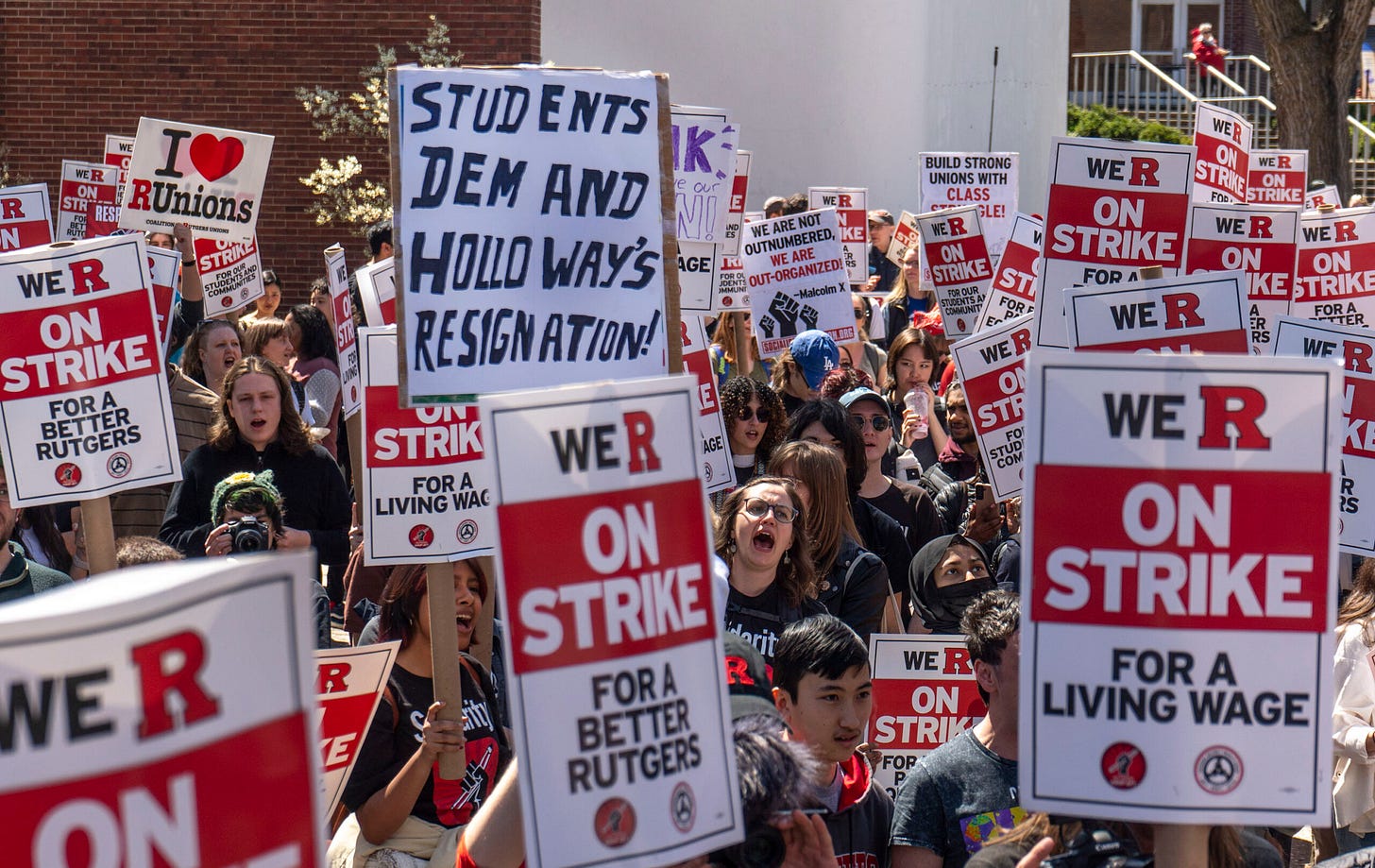You Can't Eat Prestige
A Coalition of Rutgers Unions Is Conducting a Historic Strike. #RUOnStrike.

So, the husband and I had a chance to grab dinner out last night—a rare “date night” for us—and we were talking about my ongoing identity/career/mid-life/post/para-academic crisis.
(The sordid tale of how I was laid off as a tenured full professor with a union is here and here and here).
During dinner, the idea of prestige came up.
Long story short, we ended up having a really helpful conversation about whether it matters for me (spoiler—probably not). It also reminded me of the old saying, popular among academics: “you can’t eat prestige.”
And that reminded me of the Rutgers Strike. It’s currently Day 3. Please donate to the strike fund if you can.
For most of the world, being a “college professor” looks like a prestigious job. The perception is that university faculty have a cushy gig—summers off, set your own schedule, job security—and that they come from privileged backgrounds—fancy schools, financial safety nets.
The reality is that a very small percentage of the people who teach in American colleges and Universities are even making ends meet. In 2022, the American Association of University Professors (AAUP) reported that:
“53.5 percent of higher education institutions have replaced tenure-eligible positions with contingent faculty appointments, compared with only 17.2 percent of colleges in 2004.”
Translation: “Since 2004, the number of American colleges and universities that exploit and underpay teaching staff has more than tripled.”
Setting the tenure system and its flaws aside for the moment, what that data shows is how administrators are simply continuing to hire cheap labor because they can. For example, William Paterson is currently hiring adjunct faculty to teach my former courses. They eliminated my salary in order to pay other people less for the same work. If you’re not convinced about the low pay, check out Lee Hall’s 2015 piece called “I am an adjunct professor who teaches five classes. I earn less than a pet-sitter.”
So, yeah, the bread and butter issues are very real. No doubt. But the big picture—the educational and political picture—is terrifyingly real too. For decades, colleges and universities across the United States and beyond have seen administrative bloat and exorbitant managerial salaries, ballooning athletics budgets, and a significant decrease in both state and federal funding. Colleges talk about their “business models” far more frequently than they talk about the purpose or the content of higher education. The focus is increasingly on creating institutions that provide students with a college “experience” and a piece of paper that will land them a job.
Maybe that sounds old-fashioned, like I’m just a curmudgeon yelling at those damn kids to get off my lawn. I’ll admit to a bit of that. But if the lawn in question is the college quad, I’ll be the first one welcoming everyone with open arms. Because that’s the lawn where Americans learn to think for themselves. They learn about the history of the world, about economic and political power structures, about how to identify propaganda and disinformation. About how to live as more than just worker bees in underpaid, unstable jobs.
There are 9,000 thoughtful and strong people out on strike at Rutgers right now—a coalition of academic workers that includes full-time faculty, adjunct/part-time faculty, and graduate student employees. They know that their power is in working together, and they are prioritizing solidarity over prestige. So keep rooting for them, respect their picket lines, and do whatever you can to help. It matters.





That is powerful! Thanks Maggie!
I think they’re close to a tentative agreement!